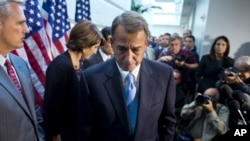WASHINGTON —
Congressional efforts to reopen the U.S. government and avoid a debt default have been thrown into chaos by a last-minute proposal emerging from the Republican-led House of Representatives, an effort that has caused a Senate plan that was nearly finalized to be put on hold less than two days before the United States risks insolvency.
The Senate’s Democratic and Republican leaders were expected to announce a bipartisan deal Tuesday that would restart federal funding and raise the nation’s borrowing limit into early next year, but the measure reportedly contained no priorities sought by House Republicans, prompting the caucus to mount a last-ditch effort to forge a package of their own.
While it is not yet clear whether the House will be able to pass any measure Republicans may settle on, the mere possibility of House action caused Senate Republicans to pull back from the all-but-completed deal with their Democratic colleagues.
Senator John Thune (R-SD) said the House should be given time to work its will.
“The House decided they could move something. And so we are obviously interested in seeing what they can get," he said.
News reports say the House initiative mirrors Senate provisions to reopen the government and remove the threat of debt default for several months, but House Republicans are reportedly also considering measures to limit President Barack Obama’s signature health care law, something the White House and congressional Democrats have long ruled out as non-negotiable amid the partial shutdown.
“Extremist Republicans in the House of Representatives are attempting to torpedo the Senate’s bipartisan progress with a bill that can’t pass the Senate — can’t pass the Senate and won’t pass the Senate," said an outraged Senate Majority Leader Harry Reid (D-Nev.) on the chamber floor.
Fellow Senator Chris Coons (D-Del.) was equally angered by the turn of events.
“It is just a shocking reminder that no balanced, bipartisan reasonable outcome in the Senate is safe from the House Republicans and Speaker Boehner jerking the wheel to the right and driving off the road," Coons said. "This is just a reckless, stunning reversal.”
Senator Lindsey Graham (R-SC) acknowledged the House action could cut in half the time Congress has to solve the fiscal impasse. But he had a message for Democrats: work with Speaker Boehner in good faith.
“You should be, for the good of the country, trying to help John Boehner," said Graham. "I am really getting to the point of disgust with some of my Democratic colleagues for making this harder for the country than it needs to be.”
But Graham’s call is falling on deaf ears. Senator Charles Schumer (D-NY) said Republican actions have made Democrats more determined than ever to hold firm against Republican conditions for a fiscal deal.
Meanwhile, the clock is ticking. The Treasury says the United States risks default unless Congress raises the debt ceiling by Thursday.
The Senate’s Democratic and Republican leaders were expected to announce a bipartisan deal Tuesday that would restart federal funding and raise the nation’s borrowing limit into early next year, but the measure reportedly contained no priorities sought by House Republicans, prompting the caucus to mount a last-ditch effort to forge a package of their own.
While it is not yet clear whether the House will be able to pass any measure Republicans may settle on, the mere possibility of House action caused Senate Republicans to pull back from the all-but-completed deal with their Democratic colleagues.
Senator John Thune (R-SD) said the House should be given time to work its will.
“The House decided they could move something. And so we are obviously interested in seeing what they can get," he said.
News reports say the House initiative mirrors Senate provisions to reopen the government and remove the threat of debt default for several months, but House Republicans are reportedly also considering measures to limit President Barack Obama’s signature health care law, something the White House and congressional Democrats have long ruled out as non-negotiable amid the partial shutdown.
“Extremist Republicans in the House of Representatives are attempting to torpedo the Senate’s bipartisan progress with a bill that can’t pass the Senate — can’t pass the Senate and won’t pass the Senate," said an outraged Senate Majority Leader Harry Reid (D-Nev.) on the chamber floor.
Fellow Senator Chris Coons (D-Del.) was equally angered by the turn of events.
“It is just a shocking reminder that no balanced, bipartisan reasonable outcome in the Senate is safe from the House Republicans and Speaker Boehner jerking the wheel to the right and driving off the road," Coons said. "This is just a reckless, stunning reversal.”
Senator Lindsey Graham (R-SC) acknowledged the House action could cut in half the time Congress has to solve the fiscal impasse. But he had a message for Democrats: work with Speaker Boehner in good faith.
“You should be, for the good of the country, trying to help John Boehner," said Graham. "I am really getting to the point of disgust with some of my Democratic colleagues for making this harder for the country than it needs to be.”
But Graham’s call is falling on deaf ears. Senator Charles Schumer (D-NY) said Republican actions have made Democrats more determined than ever to hold firm against Republican conditions for a fiscal deal.
Meanwhile, the clock is ticking. The Treasury says the United States risks default unless Congress raises the debt ceiling by Thursday.




